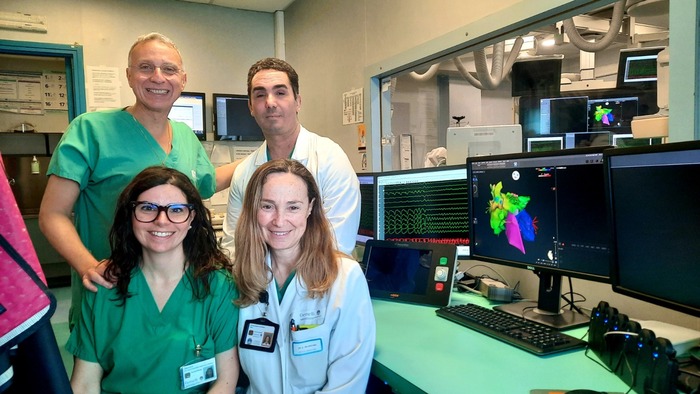Technology can literally save lives, even to the point of remotely diagnosing a heart attack in an unaware patient, allowing doctors to act immediately.
All this thanks to a 'guardian angel' defibrillator and the cardiologists of the Gemelli Polyclinic in Rome, who reported the case in the British Medical Journal Case Reports magazine.
An implantable defibrillator has therefore made it possible to discover an acute heart attack in a patient at risk of fatal arrhythmias and to 'warn' the cardiologists of the control center of the Gemelli Polyclinic who immediately sent the unsuspecting patient to hospital, without specific symptoms, to save his life with an angioplasty.
Following patients remotely, once they leave the clinic or hospital admission to see how their heart behaves as they return to their normal daily activities, even during night rest, has become common practice for years, thanks to the important technological development that implantable electronic devices have had, such as defibrillators, pacemakers or monitoring devices.
The continuous sending of signals from the device implanted to the patient to the hospital monitoring center allows the cardiologist to detect problems in the bud and intervene promptly.
This is what happens at Gemelli, where the Arrhythmology unit receives an enormous amount of information televised every day from the devices of the patients being followed.
But sometimes the potential of these technologies exceeds expectations.
As in the case of Mr. Mario (fictitious name), whose story is described in the article just published.
"Remote monitoring of the parameters detected by implantable devices - recalls Gemma Pelargonio, head of the Arrhythmology Unit of the Agostino Gemelli Irccs Polyclinic Foundation and professor of Cardiology at the Catholic University of the Sacred Heart, Rome campus - today represents an important tool in practice clinic. In this way, today we follow hundreds of our patients. The parameters monitored by these electronic devices allow us to promptly identify not only any problems with the implanted system, but also the appearance of important arrhythmias."
But in Mario's case something very special happened.
Mario, 70 years old, suffers from chronic ischemic heart disease and has had a defibrillator implanted three years ago because he has heart failure which exposes him to the risk of malignant arrhythmias.
A few months ago, during the night, the defibrillator stopped several episodes of potentially lethal arrhythmias, saving the patient's life.
Mario doesn't notice anything and doesn't think he needs his cardiologist, but the device begins to send a series of alarms to the Gemelli control center;
these are detected in real time by Linda Fulco, one of the remote monitoring technicians, who alerts the cardiologist.
Mario is immediately contacted and invited to go to the emergency room.
The patient is surprised because he does not experience any particular ailments.
Upon arrival at the emergency room, the cardiologists detect an acute myocardial infarction and Mario immediately undergoes an angioplasty.
“This case – explains Dr. Gianluigi Bencardino, UOSD of Arrhythmology of Fondazione Policlinico Gemelli IRCCS, adjunct professor of cardiology at the Catholic University of the Sacred Heart, and first author of the publication in British Medical Journal Case Reports – demonstrates how remote monitoring offers a broad spectrum of benefits for the patient, in this case the possibility of promptly diagnosing and treating an acute myocardial infarction."
"We have great expectations on the new opportunities offered by remote patient monitoring systems - comments Francesco Burzotta, director of the UOC of Cardiology at Gemelli and Associate of Cardiology at the Catholic University of the Sacred Heart -. For structures with a high flow of patients such as the Our ability to follow them even remotely allows us to avoid many unnecessary outpatient check-up visits, saving patients from travel and lost working days and at the same time shortening waiting times for other patients who instead require outpatient assessments or hospitalization. With remote monitoring we are effectively increasing our therapeutic potential and offering better assistance to our patients."
Reproduction reserved © Copyright ANSA

